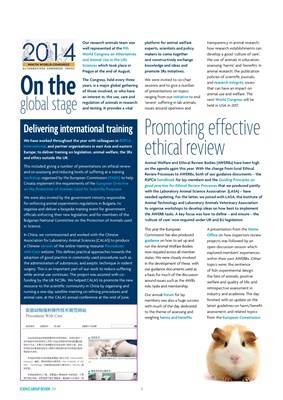
SCIENCE GROUP REVIEW 2014 18
Delivering international training
We have worked throughout the year with colleagues in RSPCA
International, and partner organisations in east Asia and eastern
Europe, to deliver training on legislation, animal welfare, the 3Rs
and ethics outside the UK.
This included giving a number of presentations on ethical review
and on assessing and reducing levels of suffering at a training
workshop organised by the European Commission (TAIEX) to help
Croatia implement the requirements of the European Directive
on the Protection of Animals Used for Scientific Purposes..
We were also invited by the government ministry responsible
for enforcing animal experiments regulations in Bulgaria, to
organise and deliver a bespoke training event for government
officials enforcing their new legislation, and for members of the
Bulgarian National Committee on the Protection of Animals used
in Science.
In China, we commissioned and worked with the Chinese
Association for Laboratory Animal Sciences (CALAS) to produce
a Chinese version of the online training resource Procedures
with Care website. This defines practical approaches towards the
adoption of good practice in commonly used procedures such as
the administration of substances, and aseptic technique in rodent
surgery. This is an important part of our work to reduce suffering
while animal use continues. The project was assisted with cofunding by
the UK NC3Rs. We helped CALAS to promote the new
resource to the scientific community in China by organising and
running a one-day satellite meeting on refining procedures and
animal care, at the CALAS annual conference at the end of June.
On the global stage Our research animals team was
well represented at the 9th
World Congress on Alternatives
and Animal Use in the Life
Sciences which took place in
Prague at the end of August.
The Congress, held every three
years, is a major global gathering
of those involved, or who have
an interest in, the use, care and
regulation of animals in research
and testing. It provides a vital
platform for animal welfare
experts, scientists and policy
makers to come together
and constructively exchange
knowledge and ideas and
promote 3Rs initiatives.
We were invited to co-chair
sessions and to give a number
of presentations on topics
ranging from our initiative to end
'severe' suffering in lab animals;
issues around openness and
transparency in animal research;
how research establishments can
develop a good 'culture of care';
the use of animals in education;
assessing 'harms' and 'benefits' in
animal research; the publication
policies of scientific journals;
and research integrity issues
that can have an impact on
animal use and welfare. The
next World Congress will be
held in USA in 2017.
Promoting effective
ethical reviewAnimal Welfare and Ethical Review Bodies (AWERBs) have been high
on the agenda again this year. With the change from local Ethical
Review Processes to AWERBs, both of our guidance documents - the
RSPCA handbook for lay members and the Guiding Principles on
good practice for Ethical Review Processes that we produced jointly
with the Laboratory Animal Science Association (LASA) - have
needed updating. For the latter, we joined with LASA, the Institute of
Animal Technology and Laboratory Animals Veterinary Association
to organise workshops to develop ideas on how best to implement
the AWERB tasks. A key focus was how to define - and ensure - the
'culture of care' now required under UK and EU legislation.
This year the European
Commission has also produced
guidance on how to set up and
run the Animal Welfare Bodies
now required across all member
states. We were closely involved
in the development of these, with
our guidance documents used as
a basis for much of the discussion
around issues such as the AWB's
role, tasks and membership.
Our annual forum for lay
members was also a huge success
with much of the day dedicated
to the theme of assessing and
weighing harms and benefits.
A presentation from the Home
Office on how inspectors review
projects was followed by an
open discussion session which
explored members' experiences
within their own AWERBs. Other
topics were: the sentience
of fish; experimental design;
the fate of animals; positive
welfare and quality of life; and
retrospective assessment in
industry and academia. The day
finished with an update on the
latest guidelines on harm/benefit
assessment, and related topics
from the European Commission.